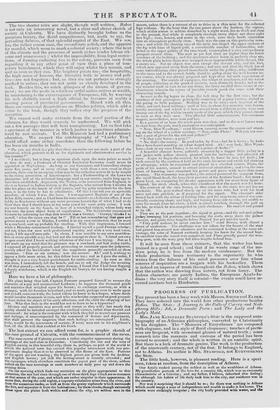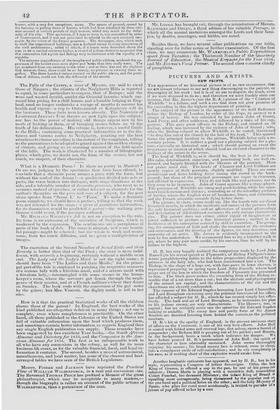PROGRESS OF PUBLICATION.
THE present has been a busy week with Messrs. SMITH and ELDER.. They have ushered into the world four other productions besides Baboo. The Stoic; A Journey to the Falls of Carery and Neil- gherry Hills; Job, a Dramatic Poem ; and The Lady and the Lady's Maid.
Mrs. JANE KINDERLEY STANFORD'S Stoic is the supposed auto- biography of an Athenian philosopher, converted to Christianity by his daughter. The " Memoirs of Eurysthenes " are composed with elegance, and in a style of florid eloquence; touches of pretti- ness are frequent, with occasional gleams of natural truth ; some research into the manners and customs of the period has been turned to account ; and the whole is written in an amiable spirit. But there is a lack of dramatic genius. The work is the production of the nineteenth century, not of the first. It belongs to England, not to Athens. Its author is Mrs. STANFORD, not ELTRYSTHENES the Stoic.
The little book, however, is pleasant reading. Here is a speci men, taken at random, from the description of Athens.
Our family ranked among the noblest as well as the wealthiest of Athens. My grandfather partook of the love for a country life, which was so eminently characteristic of a Grecian; and my father, I believe, inherited this feeling; for although his habits of life daily took him to the city, our residence was In the country.
Nor was it surprising that it should be so ; for there was nothing in Athens which could tempt a man of independence and wealth to make it his home. The streets were strikingly irregular ; the city badly provided with water, sad the
house., with a very few exceptions, mean. The spaces of ground, caused by the burning or pulling down of houses, which had been inhabited by those citi- zens accused at various periods of high treason, added very much to the defor- mity of the city. This spoliation, if I may so term it, was committed by order of (lovertiment, and it was nut permitted to rebuild on the spot rendered exe- crable by the crime of the former possessor. The Areopagus, also, which took to itself the inspection of buildings, was a declared enemy to every innovation of the civil architecture; added to which, if a house were decorated ahove the rest, or mai carried onestory higher, a crowd of jealous observers suspected that this ostentation hid a pride and feelings very inconsistent with the equality of a republic.
The extreme magnificence of the temples and public edifices, rendered the ap- pearance of the houses even more abject and 'mean than they really were. Tire rye wandered from one extreme to the other ; and as there was not the slightest link between them, there could be no beauty, no pleasure in viewing them to- gether. The three hundred statues erected on the public planes, and the porti- coes' of Athens, could not hide the deformity of the streets.























 Previous page
Previous page